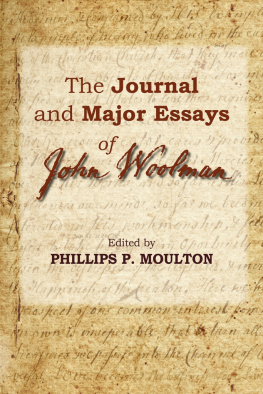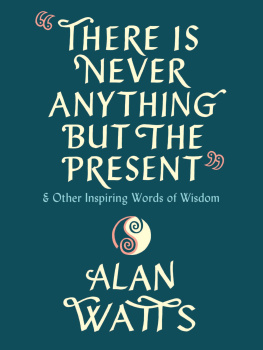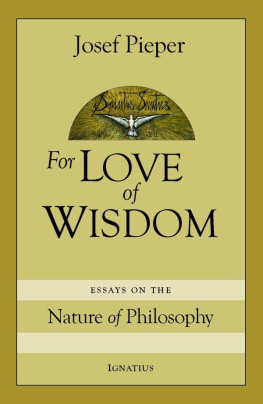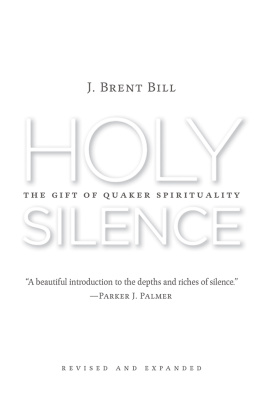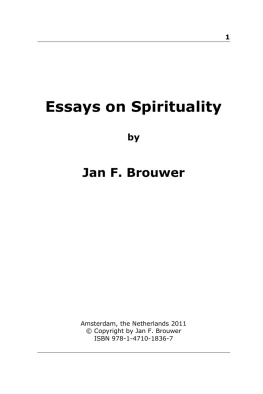
A LIBRARY OF PROTESTANT THOUGHT

EDITORIAL BOARD

JOHN DILLENBERGER, Chairman
Graduate Theological Union, Berkeley
SYDNEY E. AHLSTROM
Yale University
B. A. GERRISH
University of Chicago
ROBERT T. HANDY
Union Theological Seminary
WINTHROP S. HUDSON
Colgate Rochester Divinity School
PAUL L. LEHMANN
Union Theological Seminary
JAMES H. NICHOLS
Princeton Theological Seminary
ALBERT C. OUTLER
Southern Methodist University
JAROSLAV J. PELIKAN
Yale University
LEONARD J. TRINTERUD
San Francisco Theological Seminary
CLAUDE WELCH
University of Pennsylvania


Copyright 1971 by Friends United Press
All rights reserved. No portion of this book may be reproduced, stored in electronic retrieval system or transmitted in any form or by meanselectronic, mechanical, photocopy, recording or otherexcept for brief quotations in printed reviews, without the prior permission of the publisher.
First printing 1971
Eighth printing 2007
Friends United Press
101 Quaker Hill Drive
Richmond IN 47374
www.fum.org
Cover design by Shari Pickett Veach
Artwork of John Woolmans handwriting courtesy of Haverford College Library, Haverford, PA: Quaker Collection.
Library of Congress Cataloging-in-Publication Data
Woolman, John, 1720-1772.
The journal and major essays of John Woolman / edited by Phillips P. Moulton p. cm.
Originally published: New York: Oxford University Press, 1971, in series:
A library of Protestant thought.
Includes bibliographical references and index.
ISBN 978-0-944350-10-2
ISBN 978-1-956149-13-5 (e-book)
0-94435040-0
1. Woolman, John, 1720-1772. 2. QuakersBiography. 3. SlaveryUnited States.
4. Poor. I. Moulton, Phillips P., 1909-2002 II. Title.
BX7795.W7 A3 2000b
289.6092-dc21
00-046626
[B]
To My Wife and Children
Mary, Larry, and Kathy Moulton
A Library of Protestant Thought
A LIBRARY OF PROTESTANT THOUGHT is a collection of writings intended to illumine and interpret the history of the Christian faith in its Protestant expression. It is as variegated in its literary forms and theological positions as is the movement its mirrors. Tracts, letters, sermons, monographs, and other types of literature comprising the heritage of Protestant thought find a place in this series. Works that were originally composed in English, whether in Great Britain or in the New World, and works that were originally written in other languages, many of them not previously translated into English, are included. But it is neither necessary nor desirable that every segment of Protestant theology, piety, and ethics receive equal space. The trite theology, the conventional piety, and the platitudinous ethics always bulk larger in any tradition, also in the Protestantism of the past four centuries, than does the creative output of the religious spirit. The latter is our primary interest in this Library. While we have not felt obligated to grant them equal attention, we have included works that are typical of the more commonplace literature of the Protestant tradition. On the other hand, some works which logically belong in this series have not been included because they are readily available elsewhere.
In keeping with the fundamental purpose of this Library, the voices of Protestantism are allowed to speak for themselves, with only as much introduction, commentary, and exposition as will in fact allow them to do so. Wherever feasible, documents are reproduced in their entirety. A few representative selections have been preferred to more numerous but shorter passages, for the Library tries to depict the structure of thought rather than the genetic development of a man or a movement. Nevertheless, the variety of Protestant forms precludes a uniform treatment throughout. Our aim has been to be representative rather than exhaustive and to employ the best available tools of critical historical scholarship. Despite its ambitious scope, A Library of Protestant Thought is not an encyclopedia of Protestantism. It is a series of volumes from which not only clergymen and theologians, but students of philosophy, history, literature, political science and other disciplines can gain a more balanced view of how the Protestant mind has thought and spoken since the Reformation.
The Board is grateful to the Hazen Foundation for an initial grant enabling it to begin its work; to the Sealantic Fund, Inc., for a grant making possible Board meetings, consultations, and editorial assistance in the prepartion of specific volumes; and to the Oxford University Press for undertaking the publication of the Library.
THE EDITORIAL BOARD
Preface
The significance of Woolmans writings and the need for a new edition are discussed, respectively, in the Introduction and in of this volume. The major purpose of this edition is to reproduce with fidelity Woolmans final manuscripts: to include everything he meant to include and to exclude revisions made by others. The aim has been to produce a reliable edition, accessible to the general reader, yet sufficiently documented to meet the needs of scholars.
Editorial Methods
In editing Woolmans Journal and major essays, the method employed has been adapted from the best current examples of editorial scholarship in the field of American history. Particular reference was made to The Papers of Benjamin Franklin, now being published by Yale University Press. Two other models were frequently consulted: The Papers of Alexander Hamilton (Columbia University Press) and The Papers of Thomas Jefferson (Princeton University Press). Articles by Julian P. Boyd, L. H. Butterfield, Lester J. Cappon, Leonard W. Labaree, Waldo G. Leland, and Wilmarth W. Lewis, dealing with the editing of historical documents, have likewise been consulted. The Harvard Guide to American History, by Oscar Handlin, et al. (Cambridge, Mass., 1954, 95104), proved especially helpful.
A study of the standards and methods of the Center for Editions of American Authors (CEAA) of the Modern Language Association of America contributed many useful insights. The Statement of Editorial Principles and the Newsletters published by the Center were examined carefully, as were articles by Fredson Bowers (who has developed and articulated the editorial principles followed by the Center) and essays by Lewis Mumford and Edmund Wilson on the work of the Center. Fruitful reference has also been made to volumes bearing the Centers imprint; these include works of Nathaniel Hawthorne, Ralph Waldo Emerson, and Walt Whitman.
The work of the Center has been especially useful to the present editor because of a common major aim: to produce (as nearly as possible) a text representing the final intent of the author. For the most part, to follow the principles of the Center has been consistent with using as a general model

